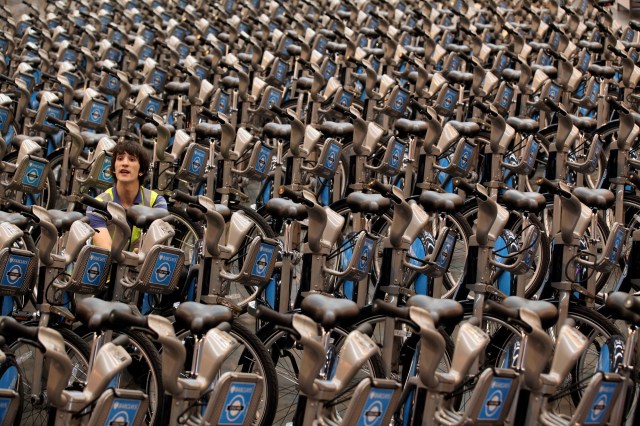
A few years back, I took a London-based job after a spell of working elsewhere. On my way into the office it dawned on me that something had changed about the city:
Bicycles!
Suddenly, they were all over the place – in noticeably greater numbers than before. The ‘bike boxes’ (or advanced stop lines) at traffic lights are often brim-full of cyclists, shiny and raring-to-go, like netted fish in a well-stocked river.
What explains this surge? It’s not as if a congested city like London is the most cycle-friendly place in the world. On the other hand, the congestion is what makes cycling a quicker option. Furthermore, the provision of cycle lanes, bike boxes and public hire schemes hasn’t just improved safety and convenience, it’s also shifted social norms – signalling that London’s roads are not exclusive to the internal combustion engine.
Perhaps, the ultimate driver (if that’s the right word) is economic. It’s now so expensive to live and work in London and other global cities that savings have to found somewhere; for many people that means swapping cars, bus passes and gym memberships for a bike. So, if you don’t like cyclists, then blame city landlords.
And, yes, there has been a backlash against the urban cyclist. In any walk of life, and any mode of transport, a given percentage of our fellow human beings behave badly and/or idiotically. Cycling is not immune.
We’ve all got our stories. Mine include the MAMIL (Middle Aged Man In Lycra) who ran a red light almost hitting me at a pedestrian crossing. When I pointed this out, he responded with some travel advice of his own. Another near miss was with a younger cyclist who came whizzing round a corner, only to complain that I was in the “middle of the road”. I was, but that’s an inevitable part of crossing one.
Pedestrians can be idiots too, of course, especially the kind fixated on their smartphones not the street. And most dangerous of all are those in motorised vehicles – not because they’re worse people, but because they’re driving a ton or more of high-speed metal.
So, mindful of the toll of death and injury suffered by cyclists, let’s try to be tolerant – and careful. It might also help to think about the ways in which we all benefit from more cycling. Consider the following from Carlton Reid of Forbes:
“New research from Transport for London (TfL) claims that people walking, cycling and using public transport spend more than motorists in local shops. Conducted by Matthew Carmona from University College London’s Bartlett School of Planning, the research reveals that those not in cars spend 40% more each month than motorists.”
The rise of online retail is often blamed for the decline of the high street – and not without reason. However, the policy response should be as much about real space as cyberspace. Shops, pubs and restaurants haven’t got a chance if they occupy environments that people want to get out of as soon as possible.
That can change. Making the urban environment friendly for cycling and walking – or ‘active transport’ to use the latest policy speak – makes it more pleasant for shopping too (and other uses of shared space):
“The research was conducted in areas of London which have benefitted from Dutch-style streetscape improvements, such as the addition of cycleways…
“In those areas improved – such as the mini-Holland redesign in the suburb of Walthamstow, ten miles north of Westminster – the number of people walking in the streets increased by 93%.
“People also spent more time in the street, with a 216% increase in activity such as going into shops and cafés.
“Thanks to the increased – and improved – footfall, retail rental values increased by 7.5% and there was a 17% decline in retail vacancies.”
Of course, there are trade-offs. More space for cyclists can mean less for motorists – especially in city centres where there’s the least room to play with.
But do we really want to prioritise the speed with which we can get in, out and through our cities? This would seem to miss the point of what a city is for.










Join the discussion
Join like minded readers that support our journalism by becoming a paid subscriber
To join the discussion in the comments, become a paid subscriber.
Join like minded readers that support our journalism, read unlimited articles and enjoy other subscriber-only benefits.
Subscribe